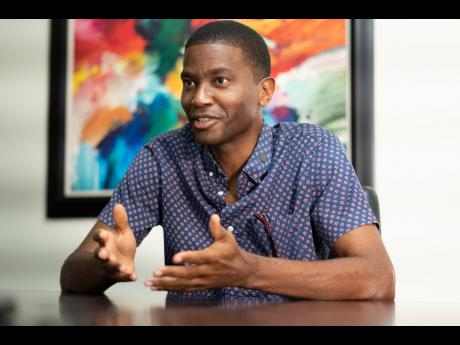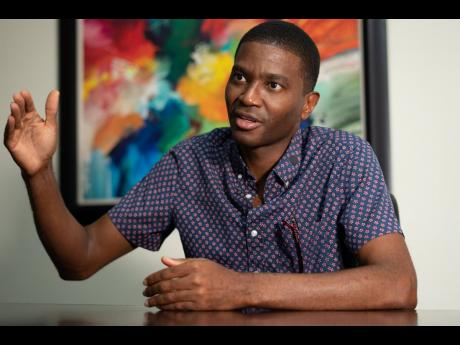‘I don’t want to be fine in a society where 90% are not’
Grenadian PM Dickon Mitchell calls on Caribbean leaders to put service above self and uplift citizens
“Hi, I am Dickon Mitchell,” he said with hand outstretched at The Jamaica Pegasus hotel, arriving with no fanfare, airs or stuffiness. Just three months after taking the reins of government in Grenada, Mitchell engaged in a wide-ranging discussion...
“Hi, I am Dickon Mitchell,” he said with hand outstretched at The Jamaica Pegasus hotel, arriving with no fanfare, airs or stuffiness.
Just three months after taking the reins of government in Grenada, Mitchell engaged in a wide-ranging discussion with The Sunday Gleaner last week, agreeing to the sit-down at short notice.
Mitchell became leader of the National Democratic Congress two months after deciding to enter public service, having spent two decades in private practice as a lawyer. Nine months later, he was being sworn in as prime minister in what appeared to be a massive return on investment in politics.
He laughed at the assessment, and agreed that it might be “somewhat of a record in the region”.
Tall with a skinny, boyish frame and a ready laugh, there was nothing juvenile about his position on fundamental Caribbean issues.
Born and raised in Grenada, the 44-year-old father of two said he received all his education in the region, receiving his primary and secondary education in Grenada before doing tertiary studies at the Cave Hill, Barbados-based campus of The University of the West Indies and the Hugh Wooding Law School in Trinidad and Tobago.
In March 1979, when the New Jewel Movement (NJM), led by a young, charismatic democratic socialist named Maurice Bishop, overthrew the regime of the country’s first prime minister, Eric Gairy, in a bloodless coup, Mitchell was just a toddler. And when Bishop himself was murdered by leftist elements within the NJM in 1983, Mitchell was five years old.
In Bishop’s Grenada, socio-economic development, education and black liberation were at the forefront of the mission to refashion the young nation, which gained independence from Britain in 1974.
Nearly four decades later, Mitchell’s vision for Grenadians embraces Bishop’s dreams.
He sees socio-economic empowerment, education and stronger regional integration, especially one which makes travel intra-regionally much easier, as key ambitions.
Memories of the bloody revolution in which several Cabinet ministers were executed are still strong and for some Grenadians today, even more painful as the remains of some of their loved ones were never found, Mitchell told The Sunday Gleaner.
“I don’t think it’s a ghost. I think, to some extent, it’s being reborn. I think the tragedy of the Grenada revolution is the fact that things tend to start where they begin. Power was taken by the force of arms. We never had general elections and there was no opportunity for the resolution of disputes via the legitimacy of the people. Instead, we ended up with a situation where we imploded and, obviously, the use of violence did not resolve issues,” he proffered.
“I think many of the aspirations, ideals and dreams of the revolution still live on in many citizens, and I think it’s an opportunity for us to rekindle that now, not just through volunteerism, but the involvement of the Grenadian diaspora and what I would call unleashing the youth talent of Grenadians,” Mitchell explained.
“For our respective Caribbean islands to move forward, we have to galvanize the energies of our people, for if we don’t, we will end up in this kind of stalemate where we just tinker, tinker, tinker and not really progress. So, I certainly don’t think it’s a ghost,” said Mitchell, who is in Jamaica as a special guest of the People’s National Party for its 84th Annual Conference.
“Part of our campaign was to rekindle the spirit of the revolution, and on Maurice’s birthday, we paid tribute to his spirit and I think that resonated with a lot of people who were involved in the revolution, because many of them are still scarred by the way it ended. Many still have emotional issues.
“Maurice’s body and many of the others killed have never been properly buried to date and the immediate families don’t know where their remains are,” he added.
Mitchell said he is not fearful of a peaceful revolution happening again in the country – and the region – as too many institutions exist to sustain themselves, rather than lift up the poor “and those doors have to come down”.
“If you have been a prime minister for 20 years, you should be able to increase people’s income per capita, increase for the betterment of the health sector, the education system, the infrastructure. I am not saying it’s easy, not saying you will not have setbacks, but there should be at least steady progress,” he said.
“Too often someone says ‘I have been prime minister for 20 years’, and you ask, ‘What is the state of the country when you found it compared to when you are leaving it?’ The education system is crumbling, more people are on social welfare and there is increase in poverty and yet still we claiming great politicians.”
He believes that Caribbean people, collectively, deserve better.
“I don’t want to be fine in a society where the other 90 per cent are not,” he stated.
He said politicians are often viewed negatively because of their inability to apologise and admit wrong. Too many reinforce their wrong with stubbornness, he stated, as he made an appeal to those interested in making a real difference to step forward and embody service above office.
Tourism, regional travel and climate justice
Mitchell was not amused that in order to come to Jamaica from the Spice Island, a CARICOM neighbour, he had to travel via New York in the United States. He said governments should not continue to pay for incompetence via domestic air travel, but he also does not believe that the people should continue to support rich airlines.
As prime minister, he often “begs” a ride on a regional security plane, but that privilege was not afforded to ordinary folks.
He said it was an embarrassment that the wife of one of his ministers live in Trinidad and it takes a month to book and travel to Grenada.
With discussions under way, he is expecting a positive decision by October or November regarding the matter of intra-regional travel.
The Caribbean, he believes, has been caught between a rock and a hard place when it comes to its dependence on tourism and the damage to ecosystems.
Anguilla has taken a bold decision not to admit cruise ships because of the potential damage to the marine environment, noting that it was not worth having such calls because of the measly average spend by passengers.
“I think it’s all the more reason why advocacy is important because we have the moral authority to be aggressive on this issue and the external threats from climate change,” Mitchell told The Sunday Gleaner.
“We don’t contribute to global warming; we know that. The large developed countries that have made commitments and have failed to deliver on them to ensure that the warming of the earth is lessened are not living up to it. They are engaged in a lot of tokenism, and even when there is conversation about climate finance, it is often too complex that you almost give up before you start, in terms of your ability to access it,” he said. “We know who is causing the problems. We know who is suffering the loss and damage; it’s the Caribbean islands.”
He said regional aggression was required on the issue, noting that Antigua and Barbuda Prime Minister Gaston Browne has already talked about climate justice. Recalling how Hurricane Dorian ravaged The Bahamas in September 2019, Mitchell noted that the Caribbean region faces the same threats annually, with island after island falling victim to fierce storms.
He also wants the region to rally in calling for apologies and reparation for slavery from former colonial powers.
“Whenever the Caribbean people seek to innovate, to find ways to sustain themselves economically, we face threats from large developed countries. It’s almost as if there is a threat which says development is limited to a certain set of people who either look the same, speak a particular way, or come from a particular region,” he said. “When you say these things, it’s not meant to be provocative, but it’s the truth.”
Like Barbados Prime Minister Mia Mottley, Mitchell believes the over-regulation of banks are threatening regional economies.
“You have a situation where the banks in the region are heavily over-regulated, to the point where it is almost impossible to open an account here. But if you go into Canada as a Grenadian citizen, you can open an account in five minutes. I have done it myself ... . The effect of which is that it pushes significant portions of the population into an informal system, where they have no bank accounts, or credit or debit cards. They literally can’t take part in the modern financial system because they can’t get a bank account,” he argued.
The large countries have argued that strict measures are a necessary evil in the global fight against money laundering and terrorism.
However, Mitchell posited that the biggest money-laundering centres were in North America, England and Switzerland, where funds of unimaginable portions – some the size of countries’ budgets – are being laundered.
“This consistent pattern where you are in survival mode all the time, that’s where we have to advocate because we’re small, we don’t have armies, but we certainly have a moral high ground,” he stated.
Mitchell said another form of tokenism is evident in the treatment some countries in the region receive from the United Kingdom, a former colonial power.
He noted that it took CARICOM’s intervention to stave off Britain’s threat to resume full control of the British Virgin Islands earlier this year after the arrest and charge of then Premier Andrew Fahie in a drug operation in the United States. The United Kingdom had threatened to impose direct rule in the British overseas territory to tackle corruption.
“There was always the threat that domestic representation will be removed because of Britain’s belief that its stance and morals in public life are not being upheld,” Mitchell said, adding that even if the allegations are true, it does not justify intervention.
Britain, he said, has no moral authority to raise questions about political and governance standards, given its own experiences, adding that “threat is a reminder to the leadership of black and brown people that imperialism is an ever-present danger”.
“We have to be mindful and not sit back and become complacent about the right to self-determination within the Caribbean,” he said, noting that current UK Prime Minister Liz Truss was the foreign secretary, who had responsibility for the autonomous British overseas territories, when the threat was issued.
“We are due reparatory justice and we are due a commitment that this will not happen again. ... And it is not just slavery. It is the 200 years after slavery, the colonisation, the deliberate structuring of our economies to service London and the UK. It is an education that is designed to service London and the UK, so that our brightest and our best always leave to go there. And today we are still grappling with that. It is still the identity that we face as a region,” he charged.


